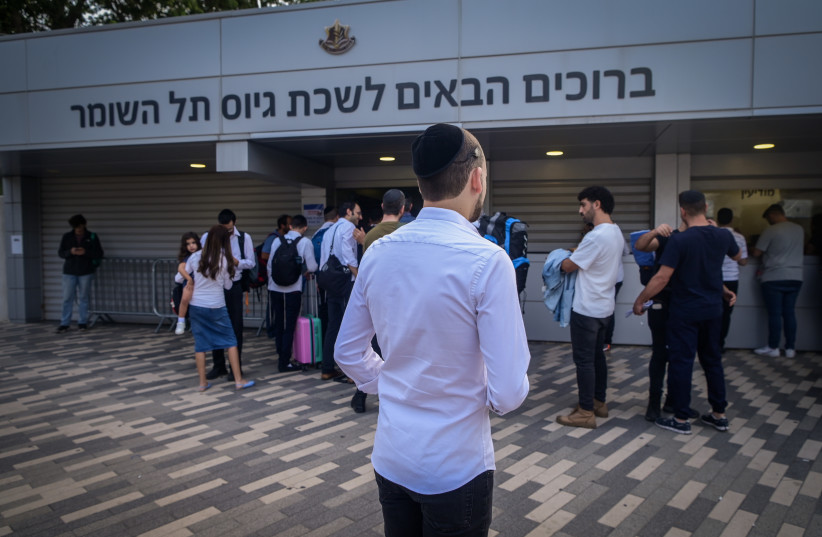The hope that the war would make the haredim (ultra-Orthodox) want to further integrate into the broader Israeli society lies in shards on the hard ground of data-based reality.
A Jewish People Policy Institute (JPPI) survey conducted by themadad.com and the Askaria polling firm shows that across all critical aspects of haredi integration and responsibility parity in Israel, according to the haredim themselves, the current war will change nothing.
Only an externally imposed change that curtails state support for the haredi way of life and requires them to shoulder their share of the security and economic burden would propel their socioeconomic integration and save Israel from a third-world future.
A few social media photos and newspaper headlines proclaiming haredi IDF enlistment sparked a sense of hope that in light of the ongoing war and the massive call-up of reserves, the haredim understood that the pre-war status quo could not hold. Some touted a haredi revelation that it was no longer possible to be nearly 20% of Israel’s Jewish population and not shoulder their fair share of the security and economic burden.
Do things really need to change?
However, a JPPI survey conducted six weeks into the war reveals that a significant majority of the haredim believe that nothing really needs to change.
Even now, as the war approaches the two-month mark and the images of some haredi males in uniform have become iconic, one-third of the haredi public sees them as indicators of a negative development. They fear these images will create rifts within haredi society and raise expectations in the broader Israeli society that haredim will enlist in the future. Another third sees it as a positive but temporary phenomenon that will not affect haredi willingness to enlist in the longer term.
Haredi resistance to any change regarding post-war conscription is sweeping. Only 9% believe that their blanket exemption from IDF conscription should be canceled.

By contrast, a huge majority of over 80% believe that whether or not there is an increasing security risk, the haredi conscription exemption should continue untouched.
One small but nevertheless bright spot is the share of haredim (about 20%) who consider alternative national service paths, for example, being part of a uniformed ZAKA emergency response team, to be a legitimate option.
The haredim are struggling to preserve and fortify the walls of the ultra-Orthodox ghetto, and they rely upon state funding to do so.
It is, therefore, not particularly surprising that the majority of haredim (55%) believe that the war will leave haredi society unchanged. Only 6% think that the war will substantially impact haredi society; another 32% believe it will move the haredi needle slightly toward deeper integration into Israeli society.
When it comes to budgetary considerations, the Haredim are convinced that what was will continue to be. Even in light of the war’s hard-hitting economic impact, one-third of the haredi public believes the budgetary allocation for their community should increase.
Forty-seven percent believe that it should be cut at a rate commensurate with other cuts the war will demand. Surprisingly, and perhaps divorced from reality, 44% of Haredim believe that the war will lead to reduced tensions between them and other Israelis. Another 24% believe there will be no tension at all.
THE BITTERSWEET aspect the war raised in the haredi context was the mobilization of many of them to pitch in and be of service in the war effort. Everyone is familiar with the images of ZAKA volunteers doing their sad but holy work after the massacre in the south and of the efforts of other haredi organizations. But the circle of haredi individuals engaged in assisting the home front is even larger.
In fact, 32% of haredim report being involved in the war effort, and another 53% know someone in their close circle who has been involved. At least, it seems the majority of haredim did not oppose it.
Haredi integration into the army and the economy poses a strategic challenge for Israel. The budget allocated to the haredi sector, which further increases support for their insularity, is detrimental not only to the exigencies of the war but also on the most fundamental level.
If the current government, or its successor, continues this approach after the war, within two decades Israel will have the services and infrastructure of a third-world country and an even more limited capacity to meet the growing security challenges.
Integration of the haredim into the broader Israeli society is not just a political issue; it is an existential one. The data show that the war will effectuate a change from within haredi society. If the majority of Israelis do not unite and demand change, the path we are on will lead us to an unspeakable abyss.
The writer is vice president of the Jewish People Policy Institute (JPPI) and a lecturer in law at the Peres Academic Center.
